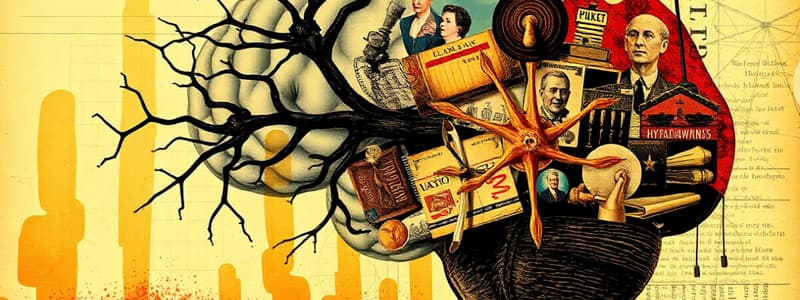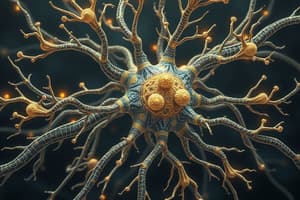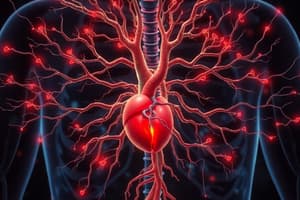Podcast
Questions and Answers
What is the primary function of the central nervous system (CNS)?
What is the primary function of the central nervous system (CNS)?
- To digest food and absorb nutrients.
- To control voluntary movements.
- To regulate hormone production.
- To process information and form a response. (correct)
Which of the following is NOT a main region of a neuron?
Which of the following is NOT a main region of a neuron?
- Cell Body
- Dendrites
- Synapse (correct)
- Axon
What is the main function of motor neurons?
What is the main function of motor neurons?
- Carrying impulses away from the brain and spinal cord to a muscle or gland. (correct)
- Transmitting electrical signals to the brain
- Processing information within the nervous system.
- Regulating body temperature.
Which hormones are secreted by the pancreas?
Which hormones are secreted by the pancreas?
What process occurs if an embryo does not implant in the endometrium?
What process occurs if an embryo does not implant in the endometrium?
Where does chemical digestion primarily begin?
Where does chemical digestion primarily begin?
What is the immediate effect of nicotine on blood vessels?
What is the immediate effect of nicotine on blood vessels?
Which of the following is a common example of a stimulant?
Which of the following is a common example of a stimulant?
What hormone is essential for sperm production and influences male secondary sex characteristics?
What hormone is essential for sperm production and influences male secondary sex characteristics?
What is the function of dendrites in a neuron?
What is the function of dendrites in a neuron?
Which type of neuron carries impulses to motor organs?
Which type of neuron carries impulses to motor organs?
What is a zygote?
What is a zygote?
Approximately how long after fertilization does the zygote undergo its first mitosis and cell division?
Approximately how long after fertilization does the zygote undergo its first mitosis and cell division?
What is one of the main functions of the placenta?
What is one of the main functions of the placenta?
Which period of life is defined as the period of growth when sexual maturity is reached?
Which period of life is defined as the period of growth when sexual maturity is reached?
Which hormones stimulate the gonads to mature?
Which hormones stimulate the gonads to mature?
What is the immediate effect of nicotine?
What is the immediate effect of nicotine?
What is the largest part of the brain?
What is the largest part of the brain?
Which part of the ear do sound waves first enter?
Which part of the ear do sound waves first enter?
What are the functions of the placenta?
What are the functions of the placenta?
Flashcards
Nervous system
Nervous system
Enables you to understand the words you read in a book
Central Nervous System (CNS)
Central Nervous System (CNS)
Processes information and forms a response
Neurons
Neurons
Transmit electrical signals, consist of dendrites, a cell body, and an axon.
Hypothalamus
Hypothalamus
Signup and view all the flashcards
Motor neurons
Motor neurons
Signup and view all the flashcards
Pancreas
Pancreas
Signup and view all the flashcards
Menstruation
Menstruation
Signup and view all the flashcards
Chemical digestion
Chemical digestion
Signup and view all the flashcards
Nicotine
Nicotine
Signup and view all the flashcards
Stimulant
Stimulant
Signup and view all the flashcards
Testosterone
Testosterone
Signup and view all the flashcards
Dendrites
Dendrites
Signup and view all the flashcards
Sensory neurons
Sensory neurons
Signup and view all the flashcards
Zygote
Zygote
Signup and view all the flashcards
Placenta
Placenta
Signup and view all the flashcards
Puberty
Puberty
Signup and view all the flashcards
Hormones stimulating gonads
Hormones stimulating gonads
Signup and view all the flashcards
Immediate effect of nicotine
Immediate effect of nicotine
Signup and view all the flashcards
Largest part of the brain
Largest part of the brain
Signup and view all the flashcards
Part of ear where sound waves enter first
Part of ear where sound waves enter first
Signup and view all the flashcards
Study Notes
Nervous System
- Enables you to understand the words you read in a book
Central Nervous System (CNS)
- Main function is to process information and form a response
Neurons
- Specialized nerve cells that help you gather information about your environment, interpret the information, and react to it
- Transmit electrical signals to various organs in the body
- Consist of three main regions:
- The dendrites
- A cell body
- An axon
Hypothalamus
- Regulates body temperature, thirst, appetite, and water balance
- Also partially regulates blood pressure, sleep, aggression, fear, and sexual behavior.
- An example is the hypothalamus when you are hungry
- Receives information from the nervous system and initiates responses through the endocrine system
Motor Neurons
- Carry impulses away from the brain and spinal cord to a gland or muscles, resulting in secretion or movement
- An example is a motor neuron stimulating your arm to move to swat a fly
Pancreas
- Produces enzymes that digest carbohydrates, proteins, and fats
- Secretes the hormones insulin and glucagon, which work together to maintain homeostasis and the level of sugar in the blood
- Diabetes mellitus is a disease that occurs when it does not regulate the amount of glucose in the blood
Menstruation
- If an embryo does not implant in the endometrium, the endometrium is shed in a process called menstruation
- Does not occur if the egg is fertilized
Chemical Digestion
- Starts in the mouth, with saliva breaks down food
Nicotine
- Increases the amount of dopamine released into a synapse
- Its immediate effect is constricted blood vessels
Stimulant
- Drugs that increase alertness and physical activity
- Example: Coffee
Testosterone
- A steroid hormone that is necessary for the production of sperm
- Influences the sex characteristics that appear during puberty
- Secondary sex characteristics include:
- Facial chest hair
- Broader shoulders
- Increased muscle movement
- Deeper voice
- Secondary sex characteristics include:
Dendrites
- Receive impulses from other neurons and conduct impulses to the cell body
- The cell body contains the nucleus and other organelles
- The axon passes those impulses on to the other neurons or muscles
Sensory Neurons
- Three kinds: sensory, interneurons, and motor neurons
- Sensory neurons send impulses from receptors in the skin and sense organs to the brain and spinal cord
- Interneurons carry impulses to motor organs
Zygote
- A fertilized egg
- Around 30 hours after fertilization, the zygote undergoes its first mitosis and cell division
Placenta
- Provides food and oxygen and removes waste
- Two sides:
- The fetal side that forms from the chorion and faces the fetus
- The maternal side that forms from the uterine tissue
- One of the main functions is to provide nutrients to the fetus
Puberty
- The period of growth when sexual maturity is reached
Other Items to Know
- Follicle-stimulating hormone (FSH) and luteinizing hormone (LH) stimulate the gonads to mature
- An immediate effect of nicotine includes increased heart rate and blood pressure
- The largest part of the brain is the cerebrum
- Sound waves first enter the outer ear, specifically in the Pinna
- The placenta provides oxygen and nutrients to the fetus, removes waste products from the fetus blood, and produces hormones to support pregnancy
- The nervous system enables you to understand the words you read in a book.
- The function of the nervous system is to receive, process, and respond to sensory input, and to control body functions and actions.
Studying That Suits You
Use AI to generate personalized quizzes and flashcards to suit your learning preferences.




